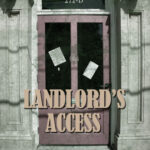 Don’t Come Knockin’
Don’t Come Knockin’
The landlord of a Bolingbrook apartment complex is being sued by a tenant because the landlord’s manager allowed the police to enter the apartment to search it.
In Illinois, a lease gives a tenant who is not in default a right to maintain the possession of a rental property free from disturbance by the landlord. Additionally, Illinois law provides the tenant in any lease with the implied right to a covenant of quiet enjoyment. The covenant prohibits landlords during the term of the lease from interfering with the tenant’s right to possession, privacy, and the use and quiet enjoyment of the rental property.
Chicago Law on Right to Access
The Chicago Residential Landlord Tenant Ordinance at Section 5-12-050 imposes rules on landlords and tenants and the times a landlord has a right to access a rental property. The ordinance sets forth those valid reasons for which a tenant must allow a landlord to enter the rental swelling unit:
- To make necessary or agreed repairs, decorations, alterations or improvements;
- To supply necessary or agreed services;
- To conduct inspections authorized or required by any government agency;
- To exhibit the dwelling unit to prospective or actual purchasers, mortgagees, workmen or contractors;
- To exhibit the dwelling unit to prospective tenants 60 days or less prior to the expiration of the existing rental agreement;
- For practical necessity where repairs or maintenance elsewhere in the building unexpectedly require such access;
- To determine a tenant’s compliance with provisions in the rental agreement; and
- In cases of emergency.
Practicalities of a Landlord’s Access
The ordinance requires that, except in cases of emergency, a landlord provide notice of the landlord’s intent to enter of “no less than two days”. A landlord may provide notice by mail, telephone, written notice to the dwelling unit, or by other reasonable means designed in good faith to provide notice to the tenant.
When proper notice is given, the tenant does not have to be present when the landlord makes entry to the rental premises. However, the landlord is prohibited from using the right of access to harass any tenant and, except in cases of emergency, the landlord should only enter at reasonable times. The ordinance defines entry between 8:00 a.m. and 8:00 p.m. or at any other time expressly requested by the tenant shall be presumed reasonable.
In those cases where a landlord makes access in an emergency, the landlord still must provide notice to the tenant of the emergency entry within two days after making entry.
Penalties for landlord violations
Section 5-12-060 of the CRLTO provides that if a landlord makes an unlawful or unreasonable entry or makes repeated unreasonable demands for entry (even if lawful) that harass the tenant, the tenant has a right to (a) an injunction to prevent the landlord’s conduct; (b) the right to terminate the lease pursuant to the required notice; (c) a penalty in an amount equal to the greater of not more than one month’s rent or twice the actual damage sustained him; and (d) attorney’s fees and court costs in any lawsuit in which the tenant prevails against the landlord regarding the violation of the CRLTO.
Back to landlords and the police
So, what does a landlord do when the police come calling? Obviously, every factual situation is going to be different, but unless the police show up with a search warrant or the police are entitled to enter based upon one of the exceptions to a warrant (criminal activity – like a shooting – going on at that time, etc.), the landlord would be best served to refrain from consenting to open a rental property for fear of breaching the tenant’s right of privacy and the implied covenant of quiet enjoyment. Landlords should think about these issues in advance so that they have a clear idea of how they would tackle a situation like this when it comes up.
